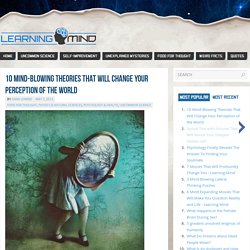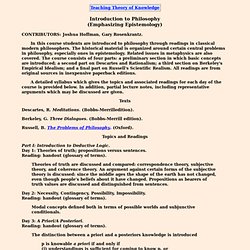

August's TOK newsletter. 森の木琴. 10 Mind-Blowing Theories That Will Change Your Perception of the World. Reality is not as obvious and simple as we like to think.

Some of the things that we accept as true at face value are notoriously wrong. Scientists and philosophers have made every effort to change our common perceptions of it. The 10 examples below will show you what I mean. 1. Great glaciation. Great glaciation is the theory of the final state that our universe is heading toward. 2. Solipsism is a philosophical theory, which asserts that nothing exists but the individual’s consciousness. Don’t you believe me? As a result, which parts of existence can we not doubt? 3. George Berkeley, the father of Idealism, argued that everything exists as an idea in someone’s mind.
The idea being that if the stone really only exists in his imagination, he could not have kicked it with his eyes closed. 4. Everybody has heard of Plato. In addition to this stunning statement, Plato, being a monist, said that everything is made of a single substance. Braingames.nationalgeographic.com/episode/1/wimgc2/?utm_source=Twitter&utm_medium=Social&utm_content=link_tw20130419ch-braingm&utm_campaign=Content/#wimgc2. How imitation can help and hinder your odds.

If you’ve ever played the childhood game of rock-paper-scissors—and who hasn’t? —you may have wondered why it usually seems to end in a draw, even though the laws of chance would dictate that over time, each player would win a third of the time. In a study published in Proceedings of the Royal Society B in 2011, University College London researchers set out to find the answer. They discovered that when they blindfolded both subjects in rock-paper-scissors games, the win-lose-tie proportion was exactly as probability would have it.
When one or players could see, however, ties frequently occurred. Them so rapidly that it appears that we’re moving in sync. That result didn’t surprise the study’s lead author, cognitive scientist Richard Cook. We all like to think of ourselves as individuals who think and act as we choose, based upon our own free will. Your Copycat Brain And to a large extent, you can’t help but be a copycat. TOK Across the Curriculum by Marie Favret on Prezi. The Skeptics Society & Skeptic magazine. 100 diagrams that changed the world. Hey <<Name>>!

If you missed last week's edition – how to avoid work and do what you love, the best history books of 2012, and more – you can catch up right here. And if you're enjoying this, please consider supporting with a modest donation. 100 Diagrams That Changed the World A visual history of human sensemaking, from cave paintings to the world wide web. But most noteworthy of all is the way in which these diagrams bespeak an essential part of culture – the awareness that everything builds on what came before, that creativity is combinatorial, and that the most radical innovations harness the cross-pollination of disciplines.
It appears that no great diagram is solely authored by its creator. The Ptolemaic System (Claudus Ptolemy, c. This 1568 illuminated illustration of the Ptolemaic geocentric system, 'Figura dos Corpos Celestes' (Four Heavenly Bodies), is by the Portuguese cosmographer and cartographer Bartolomeu Velbo. Ptolemy's World Map (Claudius Ptolemy, c. New Yorker Cartoon Epistemology.jpg. Introduction to Philosophy. Introduction to Philosophy (Emphasizing Epistemology) CONTRIBUTORS: Joshua Hoffman, Gary Rosenkrantz.

In this course students are introduced to philosophy through readings in classical modern philosophers. The historical material is organized around certain central problems in philosophy, especially ones in epistemology. Related issues in metaphysics are also covered. The course consists of four parts: a preliminary section in which basic concepts are introduced; a second part on Descartes and Rationalism; a third section on Berkeley's Empirical Idealism; and a final part on Russell's Scientific Realism. A detailed syllabus which gives the topics and associated readings for each day of the course is provided below. TOKnow-11 - Criteria for postings. Inside the World’s Largest Fact Checking Operation. Pre-IB Self Study Pack. ToK Essay Guide - ibtoktutor.com. Revision:AS Philosophy - Theory of Knowledge - Knowledge and Justification. Calvin and Hobbes and TOK by Rajesh Kripalani. Brain Health. The Stages of TOK « DCSZ TOK Class Blog.